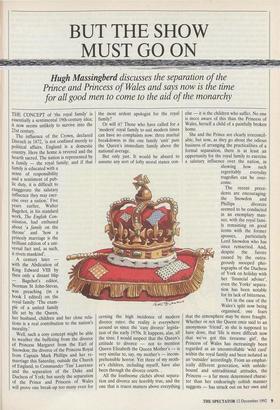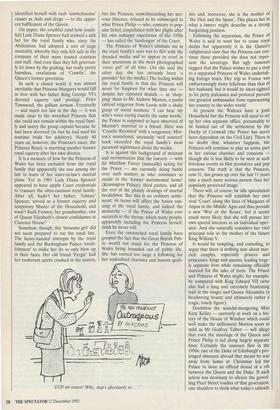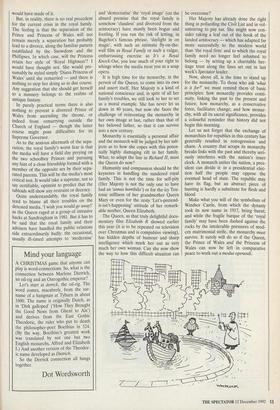BUT THE SHOW MUST GO ON
Hugh Massingberd discusses the separation of the
Prince and Princess of Wales and says now is the time for all good men to come to the aid of the monarchy
THE CONCEPT of 'the royal family' is essentially a sentimental 19th-century idea; it now seems unlikely to survive into the 21st century.
Well, such a cosy concept might be able to weather the buffeting from the divorce of Princess Margaret from the Earl of Snowdon; the divorce of the Princess Royal from Captain Mark Phillips and her re- marriage this Saturday, outside the Church of England, to Commander 'Tim' Laurence and the separation of the Duke and Duchess of York; but surely the separation of the Prince and Princess of Wales will prove one break-up too many even for the most ardent apologist for the royal family?
Or will it? Those who have called for a `modern' royal family to suit modern times can have no complaints now: three marital breakdowns in the one family 'unit' puts the Queen's immediate family above the national average.
But only just. It would be absurd to assume any sort of lofty moral stance con- cerning the high incidence of modern divorce rates: the reality is everywhere around us since the 'easy divorce' legisla- tion of the early 1970s. It happens, alas, all the time. I would suspect that the Queen's attitude to divorce — not to mention Queen Elizabeth the Queen Mother's — is very similar to, say, my mother's — incom- prehensible horror. Yet three of my moth- er's children, including myself, have also been through the divorce courts.
All the loathsome clichés about separa- tion and divorce are horribly true, and the one that is truest matters above everything else — it is the children who suffer. No one is more aware of this than the Princess of Wales, herself a child of a painfully broken home.
She and the Prince are clearly irreconcil- able, but now, as they go about the odious business of arranging the practicalities of a formal separation, there is at least an opportunity for the royal family to exercise a salutary influence over the nation, in showing how such regrettably everyday tragedies can be over- come.
The recent prece- dents are encouraging: the Snowdon and Phillips divorces seemed to be conducted in an exemplary man- ner, with the royal fami- ly remaining on good terms with the former spouses, particularly Lord Snowdon who has since remarried. And, despite the furore caused by the outra- geously snooped pho- tographs of the Duchess of York on holiday with her 'financial adviser', even the Yorks' separa- tion has been notable for its lack of bitterness.
Yet in the case of the Wales's split now being organised, one fears that the atmosphere may be more fraught. Whether or not the Queen once said to an anonymous 'friend', as she is supposed to have done, that 'life is more difficult now that we've got this tiresome girl', the Princess of Wales has increasingly been regarded as an uncontrollable 'wild card' within the royal family and been isolated as an 'outsider' accordingly. From an emphat- ically different generation, with unhide- bound and untraditional attitudes, the Princess — a far more determined charac- ter than her endearingly coltish manner suggests — has struck out on her own and identified herself with such 'unwholesome' causes as Aids and drugs — to the appar- ent bafflement of the Queen.
On paper, the youthful (and how youth- ful) Lady Diana Spencer had seemed a safe bet for the royal family who, since the Abdication, had adopted a sort of siege mentality, whereby they only felt safe in the company of their more trusted courtiers and staff. And even then they felt grievous- ly let down by the gushing, but really pretty harmless, revelations of 'Crawfie', the Queen's former governess.
In such a closed world it was almost inevitable that Princess Margaret would fall in love with her father King George VI's devoted equerry and protégé, Peter Townsend, the gallant airman. Eventually — and much too late in the day — it was made clear to the wretched Princess that she could not remain within the royal fami- ly and many the group captain because he had been divorced (in fact he had sued his wartime bride for adultery). Nearly 40 years on, however, the Princess's niece, the Princess Royal, is marrying another former royal equerry after her own divorce.
It is a measure of how far the Princess of Wales has been excluded from the royal family that apparently she was among the last to learn of her sister-in-law's marital plans. Yet in 1981 Lady Diana Spencer appeared to have ample Court credentials to reassure the ultra-cautious royal family. After all, hadn't her father, 'Johnny' Spencer, served as a former equerry and temporary Master of the Household, and wasn't Ruth Fermoy, her grandmother, one of Queen Elizabeth's closest confidantes at Clarence House?
Somehow, though, this 'tiresome girl' did not seem prepared to toe the royal line. The heavy-handed attempts by the royal family and the Buckingham Palace 'estab- lishment' to make her do so only blew up in their faces. Her old friend 'Fergie' had her exuberant spirits crushed in the system, but the Princess, notwithstanding her ner- vous illnesses, refused to be submerged in what Prince Philip — who, contrary to pop- ular belief, empathised with her plight after his own unhappy experience of the 1950s — has called the lundungus' of the Court.
The Princess of Wales's ultimate sin in the royal family's eyes was to flirt with the dreaded media and to appear to revel in their attentions as the most photographed `cover girl' of all time. (As she said the other day, she has certainly been 'a provider' for the media.) The feeling within the royal family is that the Princess will never be forgiven for what they see despite her repeated denials — as 'shop- ping' them to Mr Andrew Morton, a pushy tabloid vulgarian from Leeds with a shaky grasp of social nuances. 'I can hear my wife's voice saying exactly the same words,' the Prince is supposed to have observed of Morton's material to a friend. Here was `Crawfie Revisited' with a vengeance; Mor- ton's sensational, uncannily 'well sourced' book exceeded the royal family's most paranoid nightmares about the media.
It is against this background of mistrust and recrimination that the lawyers — with Sir Matthew Farrer (naturally) acting for the Prince — are currently doing battle over such matters as who continues to reside in the 'former matrimonial home' (Kensington Palace), third parties, and all the rest of the ghastly dealings of marital breakdown. But this is no ordinary settle- ment; its terms will affect the future run- ning of the royal family, and indeed the monarchy — if the Prince of Wales ever succeeds to the throne, which many people, apparently including the Princess herself, think he never will.
Even the entrenched royal family have grasped the fact that the Great British Pub- lic would not stand for the Princess of Wales being hounded out of public life. She has earned too large a following for her undoubted charisma and human quail- `f120 an ounce! Why, that's absolutely er. ties and, moreover, she is the mother of `the Heir and the Spare'. This places her in what a lawyer might describe as a strong bargaining position. Following the separation, the Prince of Wales is said to want her to cease royal duties but apparently it is the Queen's enlightened view that the Princess can con- tinue these provided she does not repre- sent the sovereign. But ugly rumours suggest that the Palace wishes to put a stop to a separated Princess of Wales undertak- ing foreign tours. Her trip to France was embarrassingly more felicitous than that of her husband, but it would be short-sighted to let petty jealousies and protocol prevent our greatest ambassador from representing her country to the wider world.
At present the Waleses have a joint Household but the Princess will need to set up her own separate office, presumably to be funded out of the settlement by the Duchy of Cornwall (the Prince has never been dependent on the Civil List). There is no doubt that, whatever happens, the Princess will continue to play an active part in her various charities and concerns though she is less likely to be seen at such frivolous events as film premieres and pop concerts. The truth is that the Princess, now 31, has grown up over the last 11 years into a much more serious person than her popularly perceived image.
There will, of course, be idle speculation that the Princess will establish her own rival 'Court' along the lines of Margaret of Anjou in the Middle Ages and thus provide a new War of the Roses', but it seems much more likely that she will pursue her own special interests as an individual oper- ator. And she naturally considers her vital principal role as the mother of the future King William V.
It would be tempting, and consoling, to argue that there is nothing new about mar- ried couples, especially princes and princesses, kings and queens, leading large- ly separate lives while remaining officially married for the sake of form. The Prince and Princess of Wales might, for example, be compared with King Edward VII (who also had a long and extremely frustrating wait in the wings) and Queen Alexandra (a headstrong beauty and ultimately rather a tragic, lonely figure).
Doubtless the scandal-mongering Miss Kitty Kelley — currently at work on a his- tory of the House of Windsor which could well make the millionaire Morton seem as mild as Mr Godfrey Talbot — will allege that even the marriage of the Queen and Prince Philip is led along largely separate lines. Certainly the rumours flew in the 1950s: one of the Duke of Edinburgh's pro- longed absences abroad that meant he was away from home at Christmas led the Palace to issue an official denial of a rift between the Queen and the Duke. If such action was necessary to silence the grovel- ling Fleet Street toadies of that generation, one shudders to think what today's tabloids would have made of it.
But, in reality, there is no real precedent for the current crisis in the royal family. The feeling is that the separation of the Prince and Princess of Wales will not remain merely a separation but probably lead to a divorce, along the familiar pattern established by the Snowdons and the Phillipses. In which case, will the Princess retain her style of 'Royal Highness'? I would have thought not. She would pre- sumably be styled simply 'Diana Princess of Wales' until she remarried — and there is nothing to stop her doing so in due course. Any suggestion that she should get herself to a nunnery belongs to the realms of antique fantasy. In purely practical terms there is also nothing to prevent a divorced Prince of Wales from ascending the throne, or indeed from remarrying outside the Church of England — though the latter course might pose difficulties for its Supreme Governor.
As to the anxious aftermath of the sepa- ration, the royal family's worst fear is that the media will have a field day preying on the two schoolboy Princes and pursuing any hint of a close friendship formed with a member of the opposite sex by their sepa- rated parents. This will be the media's most critical test. It would take a supreme, not to say certifiable, optimist to predict that the tabloids will show any restraint or decency.
Quite understandably, the royal family tend to blame all their troubles on the detested media. 'I wish you would go away!' as the Queen raged at a group of intrusive hacks at Sandringham in 1981. But it has to be said that the royal family and their advisers have handled the public relations side extraordinarily badly: the occasional, usually ill-timed attempts to 'modernise'
Mind your language
A CHRISTMAS game that anyone can play is word-connections. So, what is the connection between Marlene Dietrich, an oil-rig and an Ostrogothic emperor?
Let's start at derrick, the oil-rig. The word comes, macabrely, from the sur- name of a hangman at Tyburn in about 1600. The name is originally Dutch, as in 'Dirk galloped' (`How They Brought the Good News from Ghent to Aix') and derives from the East Gothic Theodoric, the ruler who put to death the philosopher-poet Boethius in 524. (By the way, Boethius's greatest work was translated by not one but two English monarchs, Alfred and Elizabeth I.) And another version of the Theodor- ic name developed as Dietrich.
So the Derrick connection all hangs together.
Dot Wordsworth
and 'democratise' the 'royal image' (on the absurd premise that the royal family is somehow 'classless' and divorced from the aristocracy) have mostly been bogus and footling. If you run the risk of letting, in Bagehot's famous phrase, 'daylight in on magic', with such an intimate fly-on-the- wall film as Royal Family or such a vulgar, embarrassing exercise as It's a Royal Knock-Out, you lose much of your right to whinge when the media treat you as a soap opera.
It is high time for the monarchy, in the person of the Queen, to come into its own and assert itself. Her Majesty is a kind of national conscience and, in spite of all her family's troubles, we still look to her to set us a moral example. She has never let us down in 40 years, but now she faces the challenge of reinventing the monarchy in her own image at last, rather than that of her beloved father, so that it can survive into a new century.
Monarchy is essentially a personal affair and the monarch will be judged by her sub- jects as to how she copes with this poten- tially highly damaging rift in her family. What, to adapt the line in Richard II, must the Queen do now?
Humanity and compassion should be the keynotes in handling the sundered royal family. This is not the time for self-pity (Her Majesty is not the only one to have had an `annus horribilis') or for the icy Teu- tonic stiffness of her grandmother Queen Mary or even for the zesty `Let's-pretend- it-isn't-happening' attitude of her remark- able mother, Queen Elizabeth.
The Queen, as that truly delightful docu- mentary film Elizabeth R showed earlier this year (it is to be repeated on television over Christmas and is compulsive viewing), has hidden depths of humour and sharp intelligence which mark her out as very much her own woman. Can she now show the way to how this difficult situation can
be overcome?
Her Majesty has already done the right thing in pollarding the Civil List and in vol- unteering to pay tax. She might now con- sider taking a leaf out of the book of the landed aristocracy — which has adapted far more successfully to the modern world than 'the royal firm' and to which the royal family need no longer feel ashamed to belong — by setting up a charitable her- itage trust along the lines set out in last week's Spectator leader.
Now, above all, is the time to stand up for the monarchy. To those who ask 'what is it for?' we must remind them of basic principles: how monarchy provides conti- nuity, linking the past to the present and future; how monarchy, as a conservative force, facilitates change; and how monar- chy, with all its sacral significance, provides a colourful reminder that history did not begin this morning.
Let us not forget that the exchange of monarchies for republics in this century has generally resulted in retrogression and chaos. A country that scraps its monarchy breaks links with the past and thereby seri- ously interferes with the nation's inner clock. A monarch unites the nation, a pres- ident can divide it: in a presidential elec- tion half the people may oppose the eventual head of state. The republic may have its flag, but an abstract piece of bunting is hardly a substitute for flesh and blood.
Make what you will of the symbolism of Windsor Castle, from which the dynasty took its new name in 1917, being burnt; and while the fragile barque of the 'royal family' may have been dashed against the rocks by the intolerable pressures of mod- ern matrimonial strife, the monarchy must survive. It surely will do so if the Queen, the Prince of Wales and the Princess of Wales can now be left in comparative peace to work out a modus operandi.




































































 Previous page
Previous page